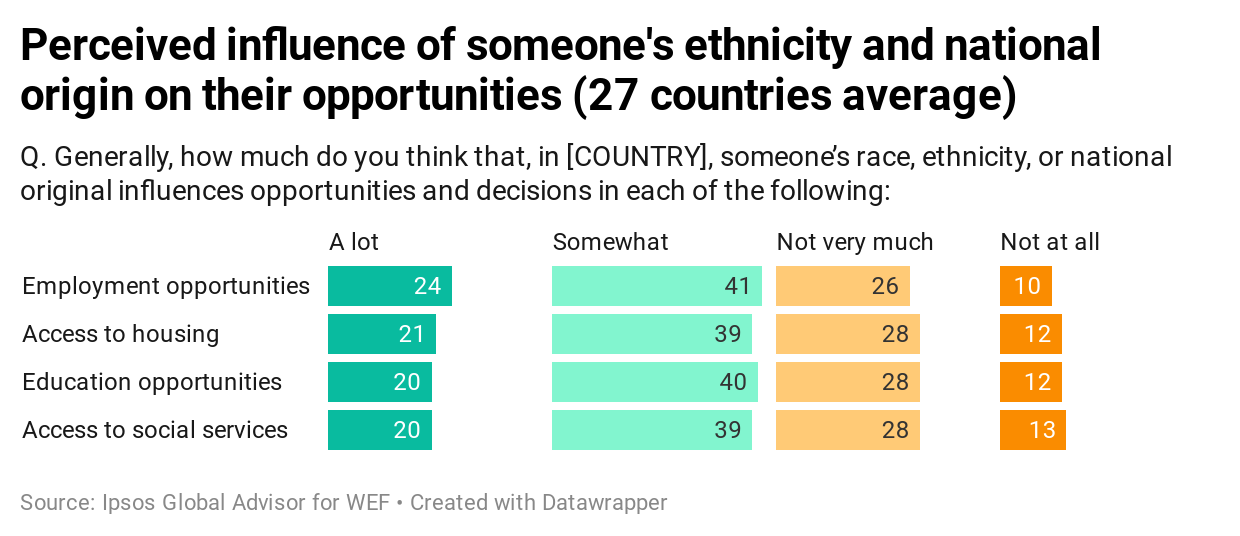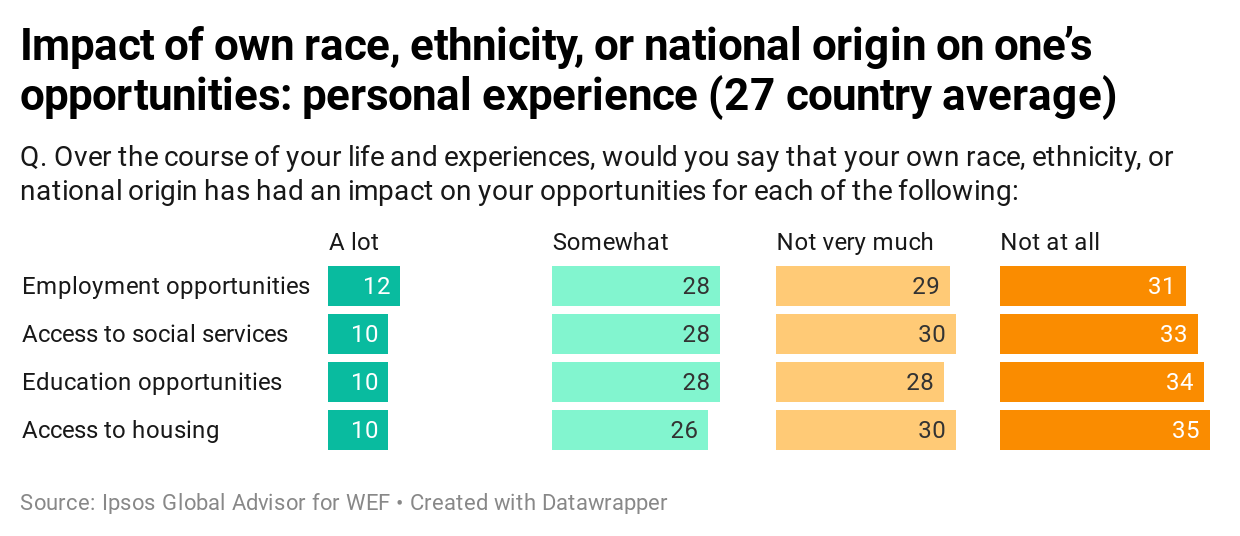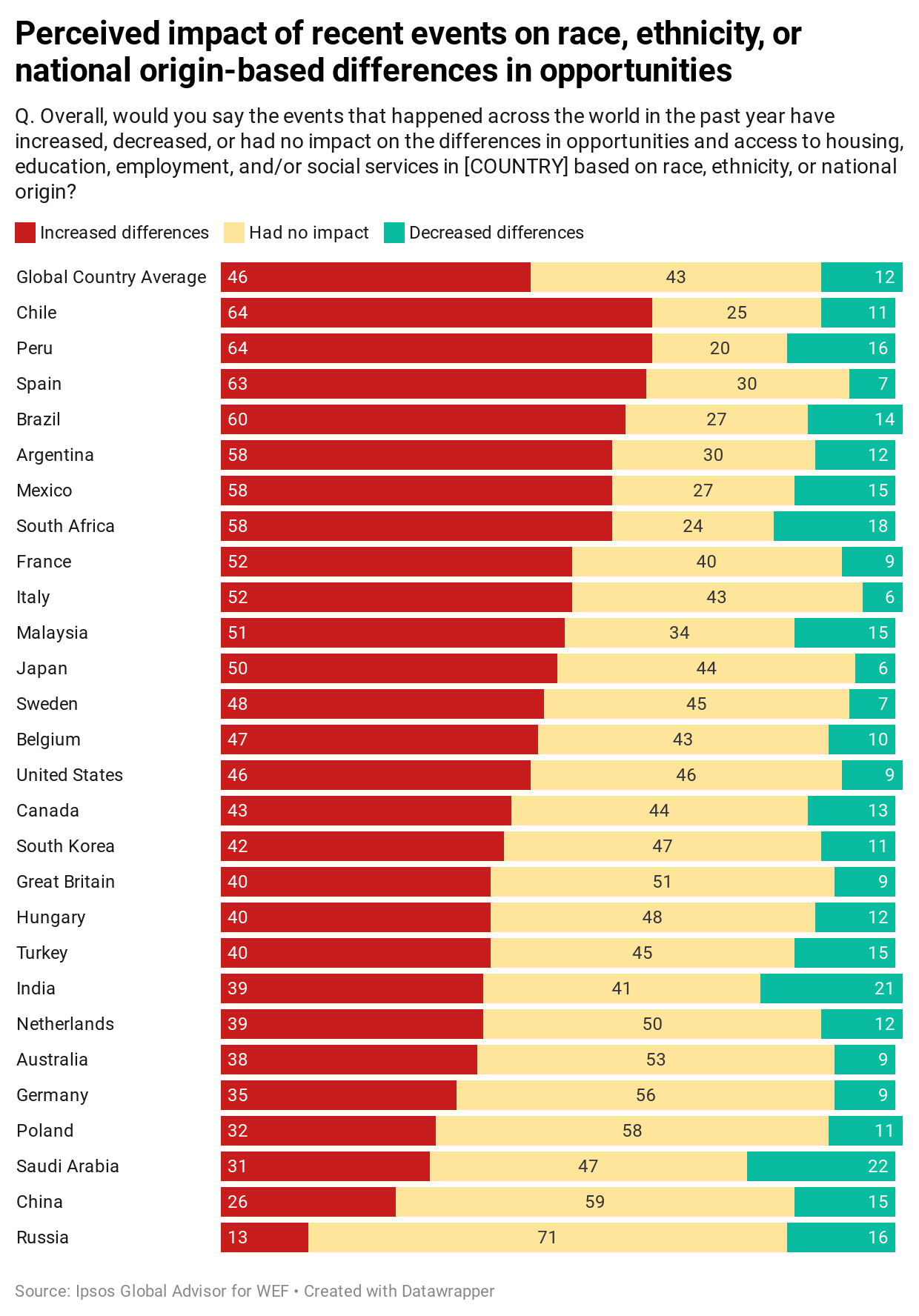The impact of race, ethnicity, and national origin on opportunities: Perceptions and personal experience
A new Ipsos survey for the World Economic Forum finds that across the 27 countries surveyed, an average of 65% of all adults think that, in their country, someone’s race, ethnicity, or national origin influences their employment opportunities. When considering their own race, ethnicity, or national origin, an average of 39% say it has impacted their own employment opportunities.
The online survey conducted between January 22 and February 5, 2021 among more than 20,000 adults in 27 countries, on Ipsos Global Advisor online platform, also reveals that, on average, 60% of adults perceive someone’s race, ethnicity or national origin plays a role in each of their education opportunities, their access to housing, and their access to social services in their country. On average, 38% report that their own race, ethnicity, or national origin has impacted their own education opportunities, 38% their own access to social services, and 35% their own access to housing. However, for each type of opportunity, about one-third say their race, ethnicity, or national origin has not had any influence at all.
On average, across the 27 countries surveyed, 46% say the events that have happened across the world in the past year have increased differences in opportunities and access to housing, education, employment and/or social services in their country, compared to 43% who say the events have had no impact on differences and 12% who say they have decreased differences. See the World Economic Forum's article.
Detailed Findings
Perceived influence of someone’s ethnicity and national origin on their opportunities
An average of 65% across the 27 countries think that, in their country, someone’s race, ethnicity, or national origin influences employment opportunities (“a lot” for 24% and “somewhat” for 41%):
- From more than seven in ten in South Africa (79%), Japan (78%), Belgium (74%), Canada (73%), the Netherlands (73%), and Brazil (71%), to less than half in Malaysia (44%).
On average, 60% consider someone’s race, ethnicity, or national origin influences their access to housing:
- From two-thirds or more in South Africa (75%), India (74%), Belgium (73%), France (70%), Germany (69%), Japan (69%), and the United States (67%), to less than half in Russia (38%), China (44%), Poland (46%), and Argentina (48%);
Again, 60% also think it has an impact on their education opportunities:
- From at least two-thirds in South Africa (76%), India (73%), Chile (68%), Brazil (68%), South Korea (67%), and Japan (67%), to less than half in Russia (39%), Sweden (47%), and Poland (47%);
And 60% also think it impacts their access to social services:
- From more than two-thirds in South Africa (74%), India (74%), Japan (69%), Brazil (68%), and Mexico (67%) to only 49% in Sweden and 42% in Russia.

Impact of own race, ethnicity, or national origin on one’s opportunities: Personal experience
On average, 39% across the 27 countries surveyed say their own race, ethnicity, or national origin has had an impact on their own employment opportunities over the course of their life (12% a lot and 28% somewhat):
- ore than half in South Africa (67%) and India (64%) report having had this experience whereas roughly half in France (56%), Hungary (49%), and Russia (49%) say it has not been the case at all;
On average, 38% on average say their race, ethnicity or national origin has impacted their education opportunities:
- More than half in India (65%), South Africa (62%), Malaysia (56%), and South Korea (55%) say it has while fewer than one in four in Russia (19%), Sweden (20%), and France (22%) do;
Another 38%, say their own race, ethnicity, or national origin has had an impact on their access to social services:
- A clear majority of adults surveyed in India (68%), South Africa (58%), and Malaysia (56%) say they it has been the case for them compared to less than one in four in Russia (20%), Great Britain (23%), and Sweden (24%);
Just over one third on average (35%), say it has influenced their access to housing:
- More than half in India (65%) and South Africa (57%) say so, compared to less than one in four who say the same thing in Russia (22%), Sweden (22%), Great Britain (23%), and France (23%).
Perceptions vs. personal experience
Perceptions and reported personal experience of how much race, ethnicity, or national origin impacts one’s opportunities varies greatly across countries. Compared with the 27-country average for all four types of opportunities measured, several countries stand out for particularly higher or lower levels of perceptions combined with particularly higher or lower levels of personal experience:
- High perception and high personal experience: South Africa and India
- High perception and low personal experience: Japan, Belgium and France
- Low perception and high experience: Malaysia
- Low perception and low experience: Russia, Poland, Sweden, and Great Britain
Impact of recent events on differences in opportunities

Opinions vary widely across countries as to whether and how the events that have happened in the past year have affected race, ethnicity, or national origin-based differences in opportunities. On average, 46% across the 27 countries say these events have increased differences while 43% say they have had no impact and 12% say they have decreased differences:
- About six in ten across Latin America, Spain, and South Africa, and about half in France, Italy, Malaysia, Japan, Sweden, Belgium, and the U.S. say recent events have increased race, ethnicity, or national origin-based differences in opportunities in their country.
- Only about one in three in Germany, Poland, and Saudi Arabia, one in four in China, and one in seven in Russia say so.




